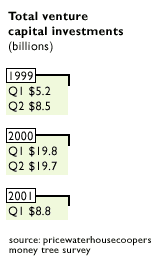Entrepreneur and Business Resources
Integral Methods and Technology
Governance and Investor Responsibility
|
From CNNfn on the web. 2 May 2001
Venture capital dives in 1Q
New funding for emerging companies is down 40 percent
so far this year
NEW YORK (CNNfn) - Venture capital financing slid at the beginning of
2001 back to levels not seen since 1999, according to a pair of venture
capital surveys released Wednesday. Rather than lamenting the drop, analysts
said the quarterly downturn represented a return to normalcy.
"The VCs are returning to a more normal pace of funding," said Tracy T.
Lefteroff, managing partner of PricewaterhouseCoopers' Venture Capital
Practice. Prior to 1999, Lefteroff noted, quarterly averages were in the
$4 billion-to-$5 billion range.
 According to the PricewaterhouseCoopers Money Tree
Survey, venture financing sank in the first quarter of 2001 to about $10.1
billion, down 40 percent from the previous quarter, when venture investors
pumped $16.8 billion into new companies.
According to the PricewaterhouseCoopers Money Tree
Survey, venture financing sank in the first quarter of 2001 to about $10.1
billion, down 40 percent from the previous quarter, when venture investors
pumped $16.8 billion into new companies.
The second survey, released by the National Venture Capital Association,
showed funding fell to $11.7 billion in the first quarter of 2001 from
$20.5 billion in the final quarter of 2000. NVCA, too, said the figure
represents a return to 1999 levels of venture investing.
Lefteroff said the downturn in public markets has sent most of the venture
capitalists into a period of funding hibernation. Rather than searching
around for new places to invest, they are hunkering down and smoothing
out problems with their existing portfolios.
As the VCs turned their backs on new investment, nearly every industry was touched by the downturn of venture funding. Venture investors turned away from electronics and computer hardware, semiconductors and consumer and business services. All of those industry segments experienced drops of more than 50 percent.
Internet companies, too, took another serious hit in the first quarter of 2001. Funding for Internet-related businesses dropped to $7.6 billion the first quarter of 2001, from $13.4 billion in the final quarter of last year.
But even those industries that had maintained steady streams of venture investment through last year saw significant funding drops in the first quarter. Investment in biopharmaceutical companies, for example, which saw strong investment in all of 2000, dropped 37 percent in the first quarter.
Only one sector, industrial companies, actually saw the level of funding increase during the first quarter. Investments there more than doubled, from $49.7 billion in the final quarter of 2000 to $113.5 billion in the first quarter of 2001.
Nobody was hit harder, however, than the smallest companies seeking seed and first round funding. The amount of money invested in early stage companies fell to about half the level of the fourth quarter of 2000.
Lefteroff acknowledged that in the past couple of years, venture capital
funding had become far too easy to come by. The amount and pace of venture
investing had gotten so frantic that some bad decisions were made and
companies went public that should not have.
One result of the current pullback in venture investing, he said, would
be a return to the days when venture capital would be hard to come by
and would require a top-shelf management team as well as a solid business
plan.
But come back they will, said Dave Witherow, president of VentureOne Corp.,
PricewaterhouseCoopers' partner in conducting the Moneytree survey. There
are several venture firms that have raised billion-dollar plus funds that
are still waiting to be invested in promising companies. Witherow added
the amount of money that flowed into the venture capital firms during
the first quarter far outpaced the amount they invested.
In other words, there's still a lot of venture money to be invested. It's
just going to be a lot harder to get. The return to old standards will
ultimately be good for the industry, said Lefteroff.
"The companies that will be IPOs in the future are going to be a lot stronger,"
said Lefteroff.